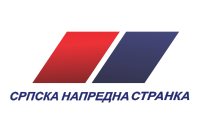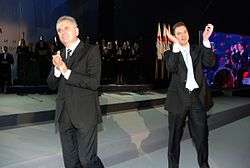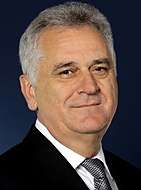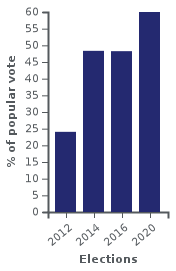Serbian Progressive Party
The Serbian Progressive Party (Serbian: Српска напредна странка, romanized: Srpska napredna stranka; abbr. СНС or SNS) is a conservative[14] and right-wing populist[15][16][11] political party in Serbia which has been the ruling party since 2012.
Serbian Progressive Party Српска напредна странка Srpska napredna stranka | |
|---|---|
 | |
| President | Aleksandar Vučić |
| Deputy President | Jorgovanka Tabaković |
| Vice Presidents | Marija Obradović Marko Đurić Miloš Vučević Milenko Jovanov |
| Parliamentary leader | Aleksandar Martinović |
| Founders | Tomislav Nikolić Aleksandar Vučić |
| Founded | 21 October 2008 |
| Split from | Serbian Radical Party |
| Headquarters | Palmira Toljatija 5, Belgrade |
| Membership (2019) | 730,000[1][2][3] |
| Ideology | Conservatism[4] Pro-Europeanism[5][6] Economic liberalism[7] Right-wing populism[8][9] Big tent[10] |
| Political position | Centre-right[11][12][13] |
| National affiliation | For Our Children |
| European affiliation | European People's Party (associate) |
| International affiliation | International Democrat Union |
| Colours | Blue |
| National Assembly | 158 / 250 |
| Assembly of Vojvodina | 65 / 120 |
| City Assembly of Belgrade | 64 / 110 |
| Party flag | |
 | |
| Website | |
| www | |
Founded in 2008 as a split from the far-right Serbian Radical Party (SRS), the culmination of a decade-long conflict within the SRS between the party's moderate and hard-line wings, the SNS managed to retain the former's national conservative outlook, while adopting distinct pro-European policies.
This combination has transformed the SNS into the current ruling party in Serbia. As it is the senior party in the current government coalition, the party's leader Aleksandar Vučić is currently serving as the President of Serbia since 2017. As of August 2020, the party holds 158 seats in the National Assembly.[17]
History

The Serbian Progressive Party was formed by a group of 21 former Serbian Radical Party (SRS) MPs led by Tomislav Nikolić. Disenchanted with the direction of the party, the pro-EU members[18] left and formed the Forward Serbia parliamentary group. The SNS was founded and held its first congressional meeting on 21 October 2008.[19]
Of the Serbian Radical Party's representatives elected in the 2008 parliamentary election, 21 moved to the Serbian Progressive Party, while 57 remained in the SRS.
In 2011, the SNS formed a pre-election coalition with New Serbia, the Strength of Serbia Movement and the Movement of Socialists to participate in the 2012 election.[20]
In the 2012 parliamentary election, the party led the "Let's Get Serbia Moving" coalition and gained 55 seats out of 73 won by the coalition in the National Assembly. Party leader Tomislav Nikolić defeated Boris Tadić of the Democratic Party in the second round of the 2012 presidential election.[21]
Following his election as President of Serbia, Nikolić stepped down as leader of the party on 24 May 2012, leaving deputy president Aleksandar Vučić in charge until a successor was elected.[22] Vučić was the only candidate who ran for the party leadership, and was elected on 29 September 2012, with Jorgovanka Tabaković as his deputy.[23]
In December 2012, the People's Party led by ex-Mayor of Novi Sad Maja Gojković, merged into the SNS.[24]
The Serbian Progressive Party maintains cooperation with the Christian Democratic Union of Germany, Fidesz, Freedom Party of Austria[25] and United Russia party.[26] On 24 April 2013 the SNS' representatives in the Parliamentary Assembly of the Council of Europe joined the Group of the European People's Party.[27]
On 18 March 2019 the Serbian Progressive Party in Belgrade signed a joint statement with the United Russia party to improve Russia-Serbia strategic partnership in the interests of both nations.[28]
On 2 April 2020, Twitter announced that they removed 8,558 reportedly fake accounts that promoted the ruling Serbian Progressive Party of Aleksandar Vučić and criticized the opposition.[29][30]
Presidents of the Serbian Progressive Party (2008–present)
| No. | President | Birth–Death | Term start | Term end | ||
|---|---|---|---|---|---|---|
| 1 | Tomislav Nikolić |  | 1952– | 21 October 2008 | 24 May 2012 | |
| 2 | Aleksandar Vučić[nb 1] | .jpg) | 1970– | 24 May 2012 | Incumbent | |
Electoral performance
Parliamentary elections
| Year | Leader | Popular vote | % of popular vote | # of seats | Seat change | Coalition | Status |
|---|---|---|---|---|---|---|---|
| 2008 | Tomislav Nikolić | Split from Serbian Radical Party | 21 / 250 |
— | opposition | ||
| 2012 | 940,659 | 24.05% | 58 / 250 |
PS | government | ||
| 2014 | Aleksandar Vučić | 1,736,920 | 48.35% | 128 / 250 |
BKV | government | |
| 2016 | 1,823,147 | 48.25% | 93 / 250 |
SP | government | ||
| 2020 | 1,953,998 | 60.65% | 158 / 250 |
ZND | government | ||
Years in government (2012–)


Presidential elections
| Year | Candidate | 1st round popular vote | % of popular vote | 2nd round popular vote | % of popular vote | ||
|---|---|---|---|---|---|---|---|
| 2012 | Tomislav Nikolić | 2nd | 979,216 | 25.05% | 1st | 1,552,063 | 49.54% |
| 2017 | Aleksandar Vučić | 1st | 2,012,788 | 56.01% | N/A | — | — |
Positions held
Major positions held by Serbian Progressive Party members:
| President of Serbia | Years |
|---|---|
| Tomislav Nikolić | 2012–2017 |
| Aleksandar Vučić | 2017– |
| Prime Minister of Serbia | Years |
| Aleksandar Vučić | 2014–2017 |
| Ana Brnabić | 2017– |
| President of the National Assembly of Serbia | Years |
| Nebojša Stefanović | 2012–2014 |
| Maja Gojković | 2014– |
| Governor of the National Bank of Serbia | Years |
| Jorgovanka Tabaković | 2012– |
| President of the Government of Vojvodina | Years |
| Igor Mirović | 2016– |
| Mayor of Belgrade | Years |
| Siniša Mali | 2014–2018 |
| Zoran Radojičić | 2018– |
See also
- Politics of Serbia
- List of political parties in Serbia
- List of Presidents of Serbia
Notes
- Acting party leader until 29 September 2012
References
- "SNS je najveća partija u Evropi po broju članova!". alo.rs.
- "SNS: Više članova nego sve stranke zajedno u dvadesetjednoj od 28 država EU". N1.
- "SNS IMA 175.000 ČLANOVA VIŠE NEGO VLADAJUĆE STRANKE U BRITANIJI I NEMAČKOJ: A ove dve zemlje imaju 140 miliona stanovnika više od Srbije!". espreso.rs.
- Dr James Dawson, ed. (2014). Cultures of Democracy in Serbia and Bulgaria: How Ideas Shape Publics. Ashgate Publishing, Ltd. p. 185.
- "Key Parties in Serbia". 27 September 2010.
- Byrne, Andrew (25 April 2018). "Ruling Progressive party claims Serbia election victory". The Financial Times.
- Stojic, Marko (2017). Party Responses to the EU in the Western Balkans. Springer. p. 138.
- "Serbia: Economic and Political Overview". Nordea Trade. Retrieved 7 October 2019.
- "Serbian political outline". Retrieved 28 April 2017.
- "Serbian Compliance Patterns towards EU Integration under the Progressive Party: An Exercise in Statecraft" (PDF). Retrieved 13 December 2018.
- "Serbia election: Pro-EU Prime Minister Vucic claims victory". BBC. Retrieved 25 September 2016.
- Marko Stojić, ed. (2017). Party Responses to the EU in the Western Balkans: Transformation, Opposition or Defiance?. Springer. p. 77.
- "Serbia's ruling conservatives claim landslide win in boycott-tainted vote". France 24. 21 June 2020.
With some 63 percent of the vote, according to Vucic, the centre-right Serbian Progressive Party (SNS) was set to dramatically expand its dominance in the 250-member parliament.
- Tamás Rónay, ed. (23 June 2020). "Welcome to the illiberal club". Eurotopics. Retrieved 12 July 2020.
In Serbia's parliamentary elections President Aleksandar Vučić's conservative SNS has consolidated its dominant position, garnering around 63 percent of the vote.
- Zulianello, Mattia (2019). "Varieties of Populist Parties and Party Systems in Europe: From State-of-the-Art to the Application of a Novel Classification Scheme to 66 Parties in 33 Countries". Government and Opposition: 5.
- "Post election Serbia: good news for the EU? | cepolicy.org".
- "National Assembly of the Republic of Serbia - Political Parties". www.parlament.gov.rs.
- "Poll: Progressive Party is pro-EU, but its voters are not". B92. 18 April 2012. Retrieved 13 August 2013.
- "Nikolić party to be called "Serb Progressive"". B92. 24 September 2008. Archived from the original on 28 September 2008.
- "Press Green". Press Online.
- "Tomislav Nikolić wins in presidential runoff". B92. 20 May 2012. Archived from the original on 23 May 2012. Retrieved 23 May 2012.
- "Serbia's new president quits as party leader". B92. 24 May 2012. Archived from the original on 21 February 2014. Retrieved 24 May 2012.
- "Progressives elect new leader, deputy leader". B92. 29 September 2012. Archived from the original on 4 February 2014. Retrieved 29 September 2012.
- "Maja Gojković: Narodna partija kolektivno prešla u SNS" (in Serbian). Blic. 3 December 2012. Retrieved 6 August 2013.
- Marcus Schneider (July 2011). "Tomislav Nikolic positioniert sich in Europa - Bündnis mit Österreichs Rechtspopulisten" (PDF) (in German). Friedrich-Ebert-Stiftung.
- "Agreement for cooperation between SNS and United Russia". SNS website. September 2011.
- "SNS becomes member of European People's Party". B92. 24 April 2013. Archived from the original on 6 October 2013. Retrieved 28 April 2013.
- "POTPISANA ZAJEDNIČKA IZJAVA: Produbiti strateško partnerstvo Srpske napredne stranke i Jedinstvene Rusije" (in Serbian). Kurir. 18 March 2019. Retrieved 19 March 2019.
- Twitter Safety (2 April 2020). "Toward the end of last year, we identified clusters of accounts engaged in inauthentic coordinated activity which led to the removal of 8,558 accounts working to promote Serbia's ruling party and its leader".
- The Guardian (2 April 2020). "Twitter deletes 20,000 fake accounts linked to Saudi, Serbian and Egyptian governments".